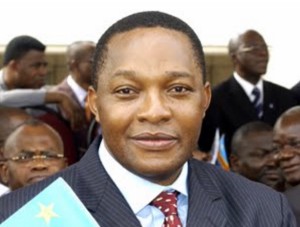EDUCATION FOR PEACE .
An article by Ntumba Luaba, KBC TV
Over the past five decades, the youth have played a central role in the numerous violent conflicts that have afflicted the African Great Lakes Region. Young people have most conspicuously been active participants in the hundreds of armed groups that have traversed the region since independence in the 1960s, operating across sovereign borders with an unsettling ease and leaving great devastation in their wake. The UN estimates that over six million civilians have lost their lives since the 1990s alone, and that the civil wars, genocides and cross-border conflicts in the region have produced the world’s highest number of fatalities since the Second World War.

Photo of Ntumba Luaba from Radio Okapi
The existence of deeply entrenched stereotypes based on ethnicity or nationality has been a key impediment for the prospects of peace in the region. These stereotypes, marinated over the decades, have long been internalised by local communities and have regrettably been handed down to successive generations, breeding hatred and placing the region’s youth in a vulnerable position for manipulation into violent conflict. As a result, many of armed groups recruit youth into their ranks through manipulation and the promise of economic reward. Cases of outright coercion of the youth have also been documented.
Numerous efforts have been undertaken over time and at different levels in an attempt to ameliorate this state of affairs, but significant change has not yet been achieved. It is understandable that much of these efforts place priority on post-conflict reconstruction. The result has been that most interventions have overlooked the fact that the process of effectively countering hatred requires us to begin by planting the seed of peace. Building sustainable peace is a long-term process which, considering the cross-border nature of the region’s conflicts, demands that we perceptualize our peacebuilding efforts from both the local and regional levels. For any peacebuilding effort to stand a chance of success in the Great Lakes region, it must also target the emancipation of the youth from the ethnic or nationalistic encumbrances that make them easy targets for recruitment or mobilization into conflict action.
(Article continued in the right column)
How do we promote a human rights, peace based education?
(Article continued from left column)
A research study carried out in 2014 by the NGO Interpeace and six partner organizations in Rwanda, Burundi and the eastern part of the Democratic Republic of Congo (DRC) found that the people in the region generally agreed that ethnic hatred is a fundamental problem in the Great Lakes region. The research also found that people across the three bordering countries endorsed peace education as a priority intervention that would both strengthen existing peacebuilding efforts and more importantly help in the prevention of conflict among future generations. The findings of this research resonate closely with the mandate of the International Conference on the Great Lakes Region (ICGLR) to promote a comprehensive approach to peace and stability in the region, a mandate that includes empowering the region’s youth to become agents of peace.
The ICGLR and Interpeace are partners in the promotion of peace in the Great Lakes region. In December 2015, the two organizations signed a Memorandum of Understanding, creating a powerful synergy in which the ICGLR brings its clout as an intergovernmental body tasked to facilitate the promotion of peace and stability in the Great Lakes region, and Interpeace contributes its unique experience and capacity to bridge between high level actors at the national and international levels, Civil Society Organizations (CSOs) and local populations at the grassroots level.
We have a strong conviction that peace education offers the promise of nurturing a new generation of youth into vanguards of peace in the Great Lakes Region. It is on this premise that the ICGLR and Interpeace will bring together key stakeholders from the region to a Peace Education Summit in Nairobi on 3 – 4 March 2016. The summit will focus on the promotion of a harmonized understanding of formal peace education in the region. The Nairobi Summit is by no means a singular engagement. It is rather a pilot initiative that could hopefully be expanded across all ICGLR member states because peace education is an invaluable investment for the future peace, security and prosperity of all member states, as well as the entire African continent.
Building peace is a collective effort in which every citizen and every stakeholder in the Great Lakes region has a role to play. We therefore call upon all key actors, particularly our member states, CSOs, other regional organizations and donor partners to embrace the idea of peace education as a preventive measure, to help us plant this seed for lasting peace in the region.
Professor Ntumba Luaba is the Executive Secretary of the International Conference on the Great Lakes Region (ICGLR), an Intergovernmental Organization established on the initiative of the African Union and the UN as a regional mechanism for peace, security, stability and development. ICGLR’s 12 core member states are Angola, Burundi, the Central African Republic (CAR), the Republic of the Congo, the Democratic Republic of Congo (DRC), Kenya, Rwanda, South Sudan, Sudan, Tanzania, Uganda and Zambia. It additionally has seven co-opted member states, namely Botswana, Ethiopia, Egypt, Malawi, Mozambique, Namibia and Zimbabwe.
(Thank you to the Global Campaign for Peace Education for distributing this article.)